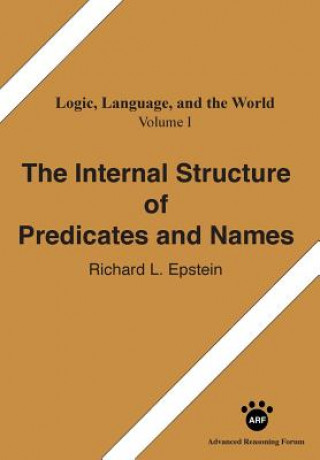
Code: 15713193
Internal Structure of Predicates and Names
by Richard L Epstein
This series of volumes is meant to extend the scope of what we can formalize in classical predicate logic, and in doing so see the real limitations of what can be done. The first section of this volume ... more
- Language:
 English
English - Binding: Paperback
- Number of pages: 300
Publisher: Advanced Reasoning Forum, 2016
- More about this

You might also like
-

Dune
35.33 zł -33 % -

Haunting Adeline
125.29 zł -2 % -

Berserk Deluxe Volume 2
214.34 zł -1 % -

White Nights
15.53 zł -23 % -

Powerless
44.97 zł -13 % -

Atomic Habits
84.78 zł -23 % -

Dune Messiah
46.70 zł -3 % -

Berserk Deluxe Volume 3
221.96 zł -

One Day
32.89 zł -36 % -

Berserk Deluxe Volume 1
213.53 zł -2 % -

Iron Flame
61.62 zł -28 % -

Surrounded by Idiots
52.38 zł -23 % -

Harry Potter and the Prisoner of Azkaban (Minalima Edition)
171.80 zł -2 % -

Gravity Falls Journal 3
89.75 zł -1 % -

Heaven Official's Blessing: Tian Guan Ci Fu (Novel) Vol. 1
89.75 zł -1 % -

The Creative Act
101.02 zł -15 % -

Dune
38.37 zł -38 % -

Hunting Adeline
131.18 zł -1 % -

A Little Life
48.93 zł -12 % -

Children of Dune
47.11 zł -2 % -

Heaven Official's Blessing: Tian Guan Ci Fu (Novel) Vol. 2
96.55 zł
Give this book as a present today
- Order book and choose Gift Order.
- We will send you book gift voucher at once. You can give it out to anyone.
- Book will be send to donee, nothing more to care about.
More about Internal Structure of Predicates and Names
You get 115 loyalty points
 Book synopsis
Book synopsis
This series of volumes is meant to extend the scope of what we can formalize in classical predicate logic, and in doing so see the real limitations of what can be done. The first section of this volume presents classical predicate logic with equality. In the second section. that logic is extended to formalize reasoning that involves adverbs and relative adjectives by viewing those as modifiers of simpler predicates. What is normally taken to be an atomic predicate, such as "barking loudly", can then have internal structure. Reasoning that involves conjunctions of terms, as in "Tom and Dick lifted the table", conjunctions of modifiers, conjunctions of predicates, and disjunctions of predicates can also be formalized by viewing them as part of the internal structure of atomic predicates. Many questions about the nature of formalizing arise in doing this. The internal structure of names is the topic of the third and last section. First, names for functions are used in classical predicate logic to form complex names. In our ordinary reasoning we also use descriptions to form functions, such as "the wife of ", and descriptions to form names, such as "the cat that scratched Zoe". To reason with those we can take account of their internal structure by dropping the assumption that every name must refer to a specific thing. The formal systems that are developed here are not just formalisms but are meant to help us understand how to reason well. Many worked examples show how to use them. Those examples also uncover limitations of the formal work. Throughout this series of volumes, the work proceeds by abstracting and creating formal models to formalize reasoning. By paying attention to the process of abstracting we gain insight into why we consider some reasoning to be good and some reasoning bad, and insight also into the deeper assumptions we make about the world on which our judgments rely.
 Book details
Book details
Book category Books in English Language linguistics Philosophy of language
198.50 zł
- Full title: Internal Structure of Predicates and Names
- Author: Richard L Epstein
- Language:
 English
English - Binding: Paperback
- Number of pages: 300
- EAN: 9781938421310
- ISBN: 1938421310
- ID: 15713193
- Publisher: Advanced Reasoning Forum
- Weight: 481 g
- Dimensions: 244 × 170 × 16 mm
- Date of publishing: 21. December 2016
safisfied customers
Since 2008, we have served long line of book lovers, but each of them was always on the first place.
Copyright! ©2008-24 libristo.pl All rights reservedPrivacyPoučení o cookies



 21 million books
21 million books Delivery 12.99 zł
Delivery 12.99 zł (32) 444 93 66 (8-15.30h)
(32) 444 93 66 (8-15.30h)